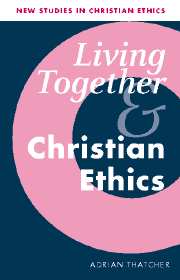General editor's preface
Published online by Cambridge University Press: 04 August 2010
Summary
This book is the twenty-first in the series New Studies in Christian Ethics. It returns to a crucial issue discussed earlier in the series in Lisa Cahill's well-received Sex, Gender and Christian Ethics – namely, how to understand Christian marriage today in a way that is both sensitive to contemporary changes in sexuality and faithful to Christian theology and tradition. Cahill writes as a modern Catholic, whereas Thatcher writes as a modern Anglican, yet they have much in common in the methods and approaches they use and in the conclusions they reach. Both authors clearly identify with Don Browning's Family, Religion and Culture project at the University of Chicago, and in particular with its central aim to defend faithful marriage in a pluralistic world (not least as the best environment for nurturing children), albeit from a liberal theological perspective.
Adrian Thatcher has already established a reputation for thoughtful writing in this area with his books Liberating Sex (1993) and Marriage after Modernity (1999). He has also shown in his Christology book Truly A Person, Truly God (1990) that he is a creative and innovative theologian. Both of these characteristics are present in the two different levels at which Living Together and Christian Ethics can be read.
At the first level this is a well-informed book about marriage and sexuality in the modern world. The first chapter shows that Thatcher has read carefully the most recent empirical information about the changing patterns that are occurring throughout the western world.
- Type
- Chapter
- Information
- Living Together and Christian Ethics , pp. ix - xiPublisher: Cambridge University PressPrint publication year: 2002



